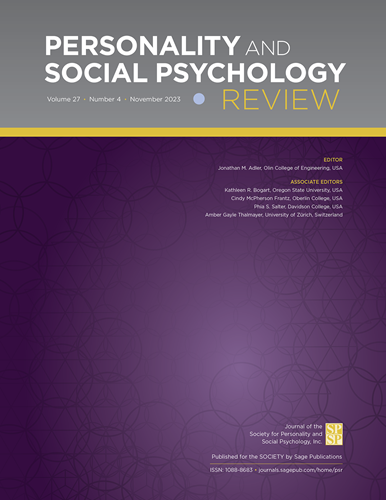Steps Toward a Psychological Theory of Prejudice in Ethiopia and Its Implications for National Unity
IF 10.4
1区 心理学
Q1 PSYCHOLOGY, SOCIAL
引用次数: 0
Abstract
Academic Abstract This paper examines the causes of ethnic and religious conflict in Ethiopia by exploring prejudice in relation to its local historical and sociopolitical factors, using psychological and sociological explanations. Indeed, prejudice in contemporary Ethiopia is not only a matter of personal attitudes but is also embedded in structural inequalities and political practices. This paper highlights the social-psychological processes of prejudice at both individual and structural levels, drawing on empirical studies of daily experiences of prejudice. The analysis includes prior research on prejudice in Ethiopia’s diverse society, alongside relevant theories of prejudice. The exploration identifies key characteristics of prejudice in Ethiopia: moral disengagement; short-termism (focusing on short-term gains); power imbalances; societal prejudice and elite prejudice; and elite preoccupation, silence, and self-serving interests. These factors contribute to an environment that undermines national unity among different ethnic and religious groups. Public Abstract In Ethiopia, prejudice has long been a pervasive part of daily life. The recent rise in ethnic and religious conflicts in Ethiopia highlights the dangers of prejudice. This paper explores historical and socio-political factors aimed at explaining the dynamics of prejudice in Ethiopia and its impact on national unity. Drawing on prior research, the paper explores the unique presentation of prejudice in the Ethiopian context. Key assumptions and characteristics identified include: dissonance; short-termism; power asymmetry; societal prejudice and elite prejudice; and elite preoccupation, silence, and self-serving interests. The exploration of prejudice offers insight for understanding and addressing the challenges posed by prejudice in Ethiopia and for promoting national unity. The paper also recognizes that, despite divisions as a result of prejudice, many Ethiopians embrace unity, seeing diversity as a strength, with government efforts supporting reconciliation.迈向埃塞俄比亚偏见的心理学理论及其对民族团结的启示
学术摘要本文通过探讨与当地历史和社会政治因素相关的偏见,使用心理学和社会学解释,研究了埃塞俄比亚种族和宗教冲突的原因。事实上,当代埃塞俄比亚的偏见不仅是个人态度的问题,而且还植根于结构性不平等和政治实践中。本文通过对日常偏见经历的实证研究,从个体和结构两个层面强调了偏见的社会心理过程。分析包括对埃塞俄比亚多元化社会中偏见的前期研究,以及偏见的相关理论。探索确定了埃塞俄比亚偏见的关键特征:道德脱离;短视主义(关注短期收益);权力失衡;社会偏见与精英偏见;精英们的专注,沉默和自私自利的利益。这些因素造成了一种破坏不同种族和宗教团体之间的民族团结的环境。在埃塞俄比亚,偏见长期以来一直是日常生活中普遍存在的一部分。最近埃塞俄比亚种族和宗教冲突的增加凸显了偏见的危险。本文探讨了历史和社会政治因素,旨在解释埃塞俄比亚的偏见动态及其对民族团结的影响。借鉴先前的研究,本文探讨了埃塞俄比亚背景下偏见的独特表现。确定的主要假设和特征包括:失调;短期行为;权力不对称;社会偏见与精英偏见;精英们的专注,沉默和自私自利的利益。对偏见的探索为理解和解决埃塞俄比亚偏见带来的挑战以及促进民族团结提供了洞察力。该报告还承认,尽管偏见造成了分裂,但许多埃塞俄比亚人拥抱团结,将多样性视为一种力量,政府努力支持和解。
本文章由计算机程序翻译,如有差异,请以英文原文为准。
求助全文
约1分钟内获得全文
求助全文
来源期刊

Personality and Social Psychology Review
PSYCHOLOGY, SOCIAL-
CiteScore
19.00
自引率
1.90%
发文量
20
期刊介绍:
Title: Personality and Social Psychology Review (PSPR)
Journal Overview:
Official journal of SPSP, the Society for Personality and Social Psychology, Inc.
Premiere outlet for original theoretical papers and conceptual review articles in all areas of personality and social psychology
Features stimulating conceptual pieces identifying new research directions and comprehensive review papers providing integrative frameworks for existing theory and research programs
Topics Covered:
Attitudes and Social Cognition: Examines the inner workings of the human mind in understanding, evaluating, and responding to the social environment
Interpersonal and Group Processes: Explores patterns of interaction and interdependence characterizing everyday human functioning
Intergroup Relations: Investigates determinants of prejudice, conflict, cooperation, and harmonious relationships between social groups
Personality and Individual Differences: Focuses on causes, assessment, structures, and processes giving rise to human variation
Biological and Cultural Influences: Studies the biological and cultural mediation of social psychological and personality processes
 求助内容:
求助内容: 应助结果提醒方式:
应助结果提醒方式:


